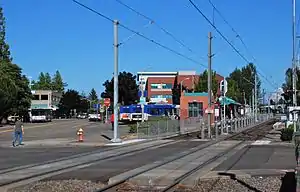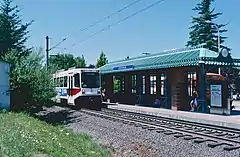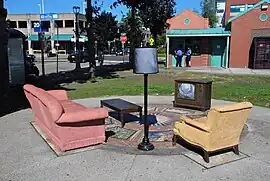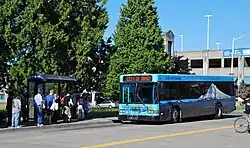Gresham Central Transit Center
The Gresham Central Transit Center, also known as Gresham Transit Center, is a TriMet transit center and MAX light rail station in Gresham, Oregon, United States. The center is a connection point for several bus routes and the MAX Blue Line. The light rail station is the 25th stop eastbound on the eastside MAX line, which was the Portland metropolitan area's first light rail line.
Gresham Central TC | |||||||||||
|---|---|---|---|---|---|---|---|---|---|---|---|
 Gresham Central Transit Center MAX platform as seen from across Hood Avenue | |||||||||||
| General information | |||||||||||
| Location | 350 NE 8th Street Gresham, Oregon U.S. | ||||||||||
| Coordinates | 45°30′10″N 122°25′38″W | ||||||||||
| Owned by | TriMet | ||||||||||
| Line(s) | Eastside MAX | ||||||||||
| Platforms | 2 side platforms 6 bus bays | ||||||||||
| Tracks | 2 | ||||||||||
| Bus routes | |||||||||||
| Bus stands | 6 | ||||||||||
| Construction | |||||||||||
| Parking | 540 spaces | ||||||||||
| Bicycle facilities | Racks and lockers | ||||||||||
| Accessible | Yes | ||||||||||
| History | |||||||||||
| Opened | 1981/82 (bus) September 5, 1986 (MAX) | ||||||||||
| Services | |||||||||||
| |||||||||||
The transit center is located at the intersection of NE Kelly Avenue and NE 8th Street in the central part of Gresham. It is a hub for bus service to points in eastern Multnomah County and Portland.
History and description
It originally opened as a bus-only transit center in 1981, named Gresham Transit Center, in the form of multiple bus stops clustered along 8th Street and Kelly Avenue, a temporary arrangement until construction of a planned off-street facility. The off-street bus layover area – a short section of bus-only road with purpose-built bus stops – was opened in February 1982.[1]
The adjacent MAX station opened in 1986, and the entire facility was renamed Gresham Central Transit Center at that time. However, TriMet continues to refer to it as Gresham Transit Center (or Gresham TC) on bus destination signs and bus schedules. The station originally had no park-and-ride lot, but TriMet built and opened a three-level garage with a ground-floor retail space in 1996.[2][3] A 30-space bike-and-ride facility (a secured parking area for bicycles) was built later, inside the garage, and opened in July 2011.[4]
Public art at the transit station includes Living Room, a sculpture comprising vintage furniture cast in concrete and a faux television set cast in bronze, which was installed in 2001 through a public art program.[5] The work was subsequently removed in October 2013.[6]
The transit center was located in TriMet fare zone 4 from 1982[7] until September 1988,[8] and in zone 3 from then until September 2012, at which time TriMet discontinued all use of zones in its fare structure.[9]
Bus service
As of September 18, 2022, this station is served by the following bus lines:[10]
- FX2–Division
- 9-Powell Blvd
- 20–Burnside/Stark
- 21–Sandy Blvd/223rd
- 80–Kane/Troutdale Rd
- 81–Kane/257th Ave
- 82–South Gresham
- 84–Powell Valley/Orient Dr
- Sandy Area Metro service to Sandy, Oregon
Gallery
 A 1989 photo, when the line section on which the station is located was still bidirectional single-track
A 1989 photo, when the line section on which the station is located was still bidirectional single-track Artwork included Living Room (2001) by Tamsie Ringler before it was dismantled in 2013
Artwork included Living Room (2001) by Tamsie Ringler before it was dismantled in 2013 The transit center's bus area, with the 1982-opened bus-only roadway in the center
The transit center's bus area, with the 1982-opened bus-only roadway in the center A Sandy Area Metro bus at the transit center
A Sandy Area Metro bus at the transit center
See also
References
- "Tri-Met hails bus line successes". The Oregonian, January 27, 1982, p. B4
- Briggs, Kara (July 15, 1996). "A new city hall in town". The Oregonian (East Metro edition), p. B2.
- "Gresham Park & Ride garage open for business" (Press release). TriMet. July 15, 1996. Archived from the original on January 19, 1997. Retrieved December 26, 2020.
- Rose, Joseph (July 18, 2011). "TriMet opens Gresham, Beaverton bike-and-rides, hopes facilities used more than first". The Oregonian. Retrieved December 17, 2011.
- Genovese, Fran (November 6, 2008). "Trouble in Gresham's 'Living Room'". The Oregonian. Retrieved December 17, 2011.
- Tomlinson, Stuart (October 15, 2013). "'The Living Room' art installation at TriMet's Gresham Transit Center will be removed". The Oregonian. Retrieved October 16, 2013.
- Federman, Stan (August 29, 1982). "Fare boosts, new routes expected to reverse Tri-Met trends". The Oregonian, p. C2.
- Houston, Bryan K. (September 2, 1988). "Tri-Met changes go into effect Sunday". The Oregonian, p. E10.
- Bailey Jr., Everton (August 30, 2012). "TriMet boosts most fares starting Saturday; some routes changing". The Oregonian. Retrieved December 9, 2012.
- "Rail System" (Map). TriMet. September 18, 2022. Retrieved September 18, 2022.
External links
- Gresham Central Transit Center – TriMet page